Proposal to increase support for pre-1995 retirees On the afternoon of June 25, continuing the 7th Session, the National Assembly discussed in groups the contents of
salary reform ; adjusting pensions, social insurance benefits, preferential benefits for people with meritorious services and social benefits from July 1, 2024. Speaking at the discussion in Group 8, delegate Le Kim Toan (Binh Dinh) said that in salary reform, the most important point according to the Central Resolution is to implement the new salary policy, issue and implement the new salary scale, including salary payment according to job position. Due to many objective and subjective factors, we have postponed the implementation of the new salary reform policy until the latest date according to the National Assembly Resolution after adjustment, which is July 1, 2024. The delegate stated that up to this point, the issuance of the new salary scale and implementation of new salary payment according to job position is difficult to implement.
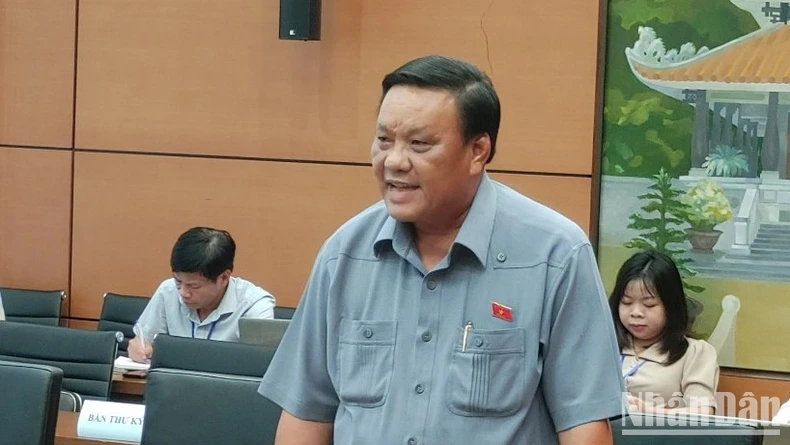 |
| Delegate Le Kim Toan (Binh Dinh) speaks. (Photo: TRUNG HUNG) |
According to the Government's report, further research is needed to find the most feasible solution. Therefore, in the immediate future, instead of implementing a new salary scale paying salaries according to job positions, the Government has proposed to increase the basic salary for cadres, civil servants and public employees by 30%, at the same time increase the regional minimum wage to serve as a basis for increasing salaries for workers by 6%, increasing pension allowances by 15%, increasing allowances for social protection beneficiaries, meritorious people at corresponding rates, etc. "I think that when the new salary scale has not been issued, increasing the basic salary is necessary. However, the Government needs to speed up the research progress, at the latest by the end of this term, it must form a new salary scale and identify job positions to pay salaries for civil servants and public employees according to job positions according to the Resolution of the Central Committee, so that it can be implemented from the new term", delegate Toan expressed his opinion. The delegate also recommended that it is necessary to calculate and have a suitable plan to compensate for the increase for public service units operating under the autonomous mechanism. In addition, if the state budget source is guaranteed, it is necessary to pay more attention to increasing the salary for those who
retired before 1995. "It is necessary to pay attention to this group because when we had not implemented salary reform before, salaries and incomes were low, as well as there was a very large gap between those who held positions and retired before 1995 and the generation of officials who retired after 1995," the delegate stated. Believing that it is necessary to calculate this point, delegate Toan also stated that the increase in the living standards and income of officials, civil servants and public employees is a good thing, but each time the salary is increased, the above gap needs to be gradually reduced. Therefore, the delegate recommended that it is necessary to increase the salary for those who retired before 1995 with an increase higher than 15%. Assessing the Government's proposal to increase salaries, adjust pensions and allowances from July 1, which basically follows the direction of the Politburo in Conclusion No. 83-KL/TW, delegate Tran Van Tien (Vinh Phuc) also found that this adjustment has ensured a balanced, fair and equal correlation between salary and allowance recipients; harmoniously resolved social relations, controlled social polarization, and ensured social security for the people in the development process. Specifically analyzing, the delegate said that the adjustment of the basic salary from the current VND 1.8 million to VND 2.34 million/month, an increase of 30%, is equivalent to a 15% increase in pensions and social insurance allowances. The reason is that officials and civil servants who receive a 30% increase in basic salary have to pay 8% for social insurance, so the actual salary received is 22%. Meanwhile, pensioners who receive a 15% increase do not have to pay social insurance, so they will receive the full increase. "Thus, the Government's proposal to adjust the basic salary this time is relatively reasonable, there is no big gap between the adjustment of the basic salary in the public sector and pensions and social insurance benefits. If we say that the absolute number is relatively large, but if we analyze it in detail and carefully, it will be reasonable," said the delegate.
Salary increase will not be effective without innovation in personnel work. Highly appreciating the content of the salary increase according to the Government's proposal, delegate Truong Xuan Cu (Hanoi) said that the salary increase at this time is appropriate and ensures a stable income, thereby motivating cadres, civil servants and workers to work and complete assigned tasks better. However, delegate Cu also raised some concerns, because in practice, many units, especially newly established units, only recruit enough people, not recruit people according to expertise or job positions. “To reform salaries, it is necessary to actively streamline the payroll. There are units with hundreds of surplus people, but since 2020 until now, they have not been able to streamline the payroll. There are also some people who were recruited as drivers, but now they have become law graduates. Now, if we put them in a law position, it is very difficult and we do not dare to arrange other jobs or streamline the payroll for them,” said delegate Truong Xuan Cu. Regarding the salary scale of management leaders, delegate Cu also raised concerns, if salaries are increased and arranged correctly, it will be very timely to motivate, but in the current personnel work, it is still based on terms, still 5 years. “For example, a very good deputy department head only has 4 years left to work, while the department head has retired. So will that good deputy department head be appointed? Or will someone else, with lower qualifications, be appointed and receive a high salary? I have witnessed a deputy department head only handle 1 document per month, while a specialist handles 97 documents per month. Therefore, if we do not innovate in personnel work, it will lead to the elimination of talent, and salary increases will not bring high efficiency in work,” said delegate Cu. Meanwhile, delegate Ly Anh Thu (Kien Giang) suggested that when adjusting the increase in basic salary, pensions and allowances, it is necessary to pay attention to controlling the prices of goods on the market, avoiding the situation of “
when salary increases, prices increase ”, in the end, the salary increase is not much, reducing the effectiveness of adjusting the basic salary. Regarding other contents, delegate Ly Anh Thu said that when meeting with voters and social welfare recipients, she received many opinions agreeing with the social protection increase of 500 thousand VND. "Such an increase in social protection at this time is suitable for the general level of life", the delegate commented. The female delegate suggested that in the coming time, the Government should also have a roadmap to gradually increase social benefits to suit the actual conditions of the country in each period and each time. Along with that, the Government should also implement additional support policies for those who are unable to escape poverty.
Clearly identify resources to implement the new salary regime 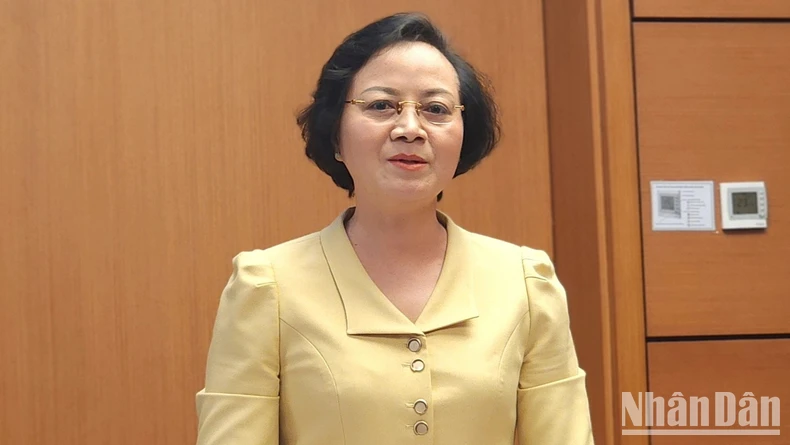 |
| Minister of Home Affairs Pham Thi Thanh Tra explains why the basic salary and salary coefficient have not been abolished. (Photo: TRUNG HUNG) |
Speaking at the group discussion session, Minister of Home Affairs Pham Thi Thanh Tra affirmed that salary policy reform is a major and important issue, directly related to the macro economy, economic growth and directly affecting nearly 10 million cadres, civil servants, public employees, armed forces, and meritorious people. At the same time, it also directly affects about 10 million current social policy beneficiaries and about 15,000 workers in enterprises (state-owned and private). Therefore, when implementing Resolution 27 of the Central Executive Committee, the Central Steering Committee on salary policy reform, the Prime Minister and the Government Standing Committee held 21 meetings to thoroughly discuss the contents of salary reform; adjusting pensions, social insurance benefits, preferential benefits for meritorious people and social benefits from July 1, 2024. The Standing Committee of the Steering Committee has organized to collect opinions from departments, ministries, branches, experts, and managers to complete the draft report. However, the abolition of the basic salary and salary coefficient to build basic salary levels with specific amounts in the new salary tables has many shortcomings, typically the new salary correlation is not reasonable between salary recipients. "Some subjects will be increased by more than 30%, others will be increased by less than 5-7-15%, but many subjects will be increased lower than their current salary, especially the salary table for positions and leadership titles," said the Minister of Home Affairs, emphasizing that this is the biggest problem. Another problem that arises is that when changing the structure of the allowance fund (which will be reduced by 24% compared to present) and eliminating seniority allowances for cadres, civil servants, and public employees in some specialized fields (only prescribed for the armed forces), many current allowance regimes must be rearranged into a new allowance regime, which leads to many difficulties. “It is very difficult to ensure the salaries of those who we want to pay attention to, such as teachers and health workers, because the current salaries of these people are receiving very high allowances. If they work in particularly difficult areas, the allowances will be even higher. But when implementing the new salary reform, all allowances must be rearranged,” the Minister said. Another problem the Minister pointed out is the construction of job positions. Although the construction of job positions has been implemented since 2012, there are still many difficulties. Recently, the entire political system has rushed to complete and approve the job position project, but in general, it has not ensured the requirements and quality. Moreover, the Politburo has not yet issued a list of job positions in the political system, so the design and construction of job positions, associated with the description and competency framework of the job positions, are still stuck. Faced with the above difficulties, the Government finally presented a plan to reform the wage policy in a reasonable, step-by-step, cautious, certain, feasible and effective manner. "We will do it as clearly as possible, and continue to study and improve any difficulties, problems or shortcomings, without being perfectionist or hasty, to ensure stability and no disruption," said Minister Pham Thi Thanh Tra. In the near future, wage reform will be implemented for the business sector, implemented synchronously and fully in accordance with the spirit of Resolution 27. Immediately after that, a 6% wage increase will be adjusted for businesses from July 1, 2024. In addition, very specific instructions will be required to implement the wage mechanism in state-owned enterprises. For the public sector, we have implemented 4/6 basic contents such as supplementing the bonus regime from July 1, 2024 (bonus fund equal to 10% of the basic salary fund)... In line with this, the Government has clearly identified the sources to implement the new salary regime. With a 30% increase in the basic salary - the highest increase since the implementation of salary reform, according to the calculation of the Ministry of Finance, the total funding requirement to adjust the basic salary by 30%, implement the bonus of 10% of the basic salary fund, adjust the pension and cumulative allowance for 3 years from 2024-2026 will increase by 913,300 billion VND. According to Minister Pham Thi Thanh Tra, initially, the Government calculated the average total source of implementation according to Resolution 27 for all 3 years to be about 786 trillion VND, an average increase of about 23% when implementing salary reform. However, when adjusting the basic salary by 30% and implementing the 10% bonus for the basic salary fund and related policies, the total amount will increase to VND913,300 billion, which means an increase of VND127 trillion. "This session will propose to supplement the source for implementing salary reform and related policies in 2024 and will continue to adjust and supplement next year," the Minister of Home Affairs informed and affirmed that the Government ensures enough resources for implementation.
Nhandan.vn
Source: https://nhandan.vn/tang-luong-co-so-la-can-thiet-khi-chua-ban-hanh-bang-luong-moi-theo-vi-tri-viec-lam-post816076.html

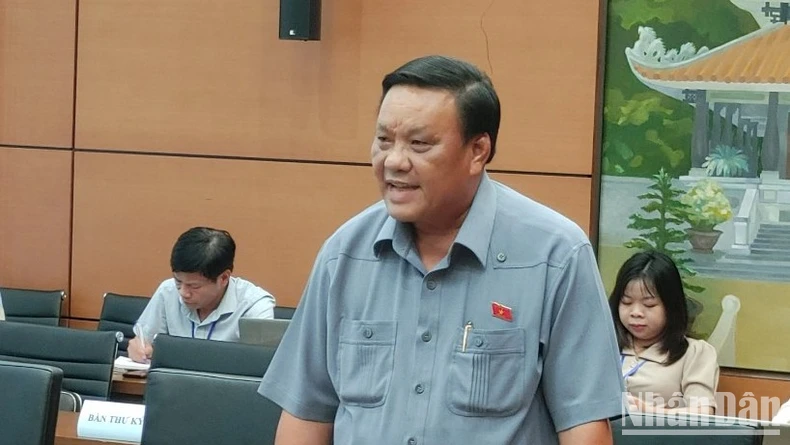
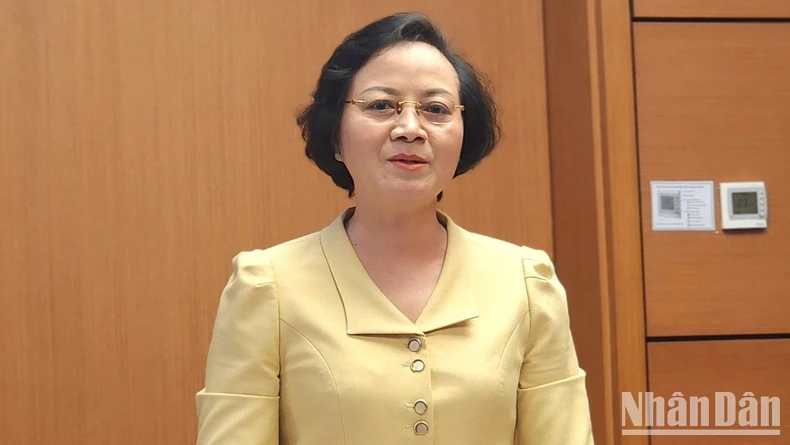





![[Photo] General Secretary attends the parade to celebrate the 80th anniversary of the victory over fascism in Kazakhstan](https://vphoto.vietnam.vn/thumb/1200x675/vietnam/resource/IMAGE/2025/5/7/dff91c3c47f74a2da459e316831988ad)

![[Photo] Sparkling lanterns to celebrate Vesak 2025](https://vphoto.vietnam.vn/thumb/1200x675/vietnam/resource/IMAGE/2025/5/7/a6c8ff3bef964a2f90c6fab80ae197c3)









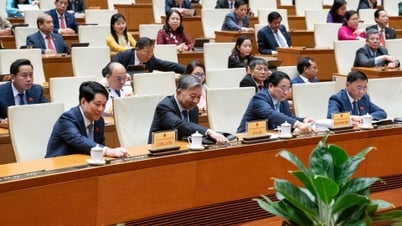



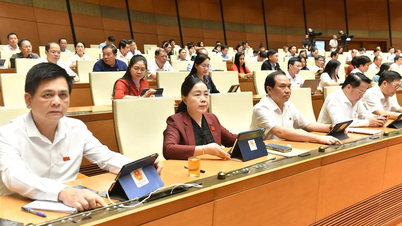
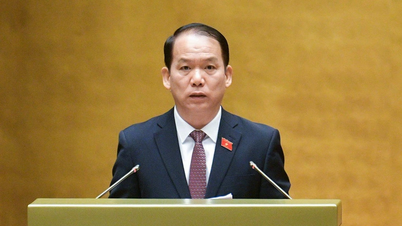
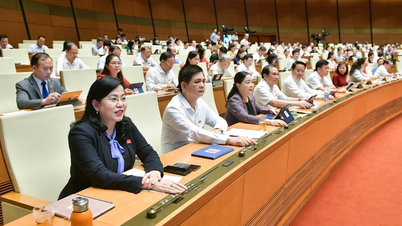








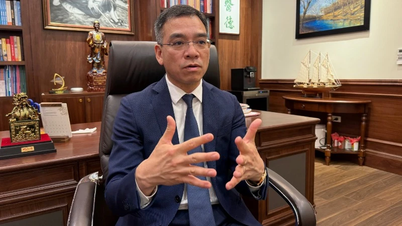































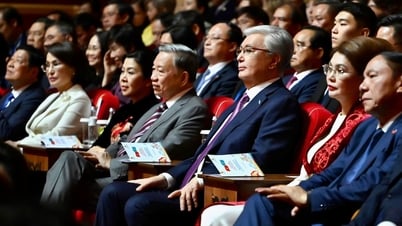



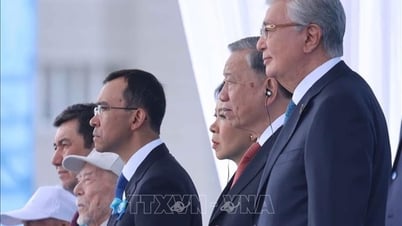

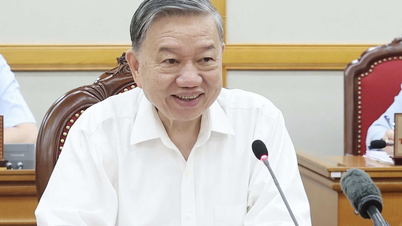

















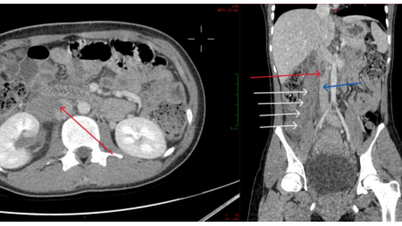









Comment (0)